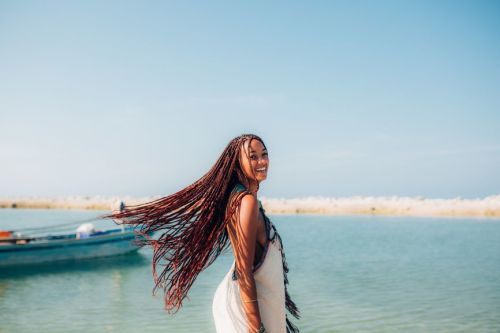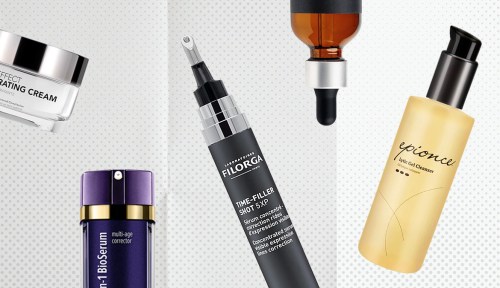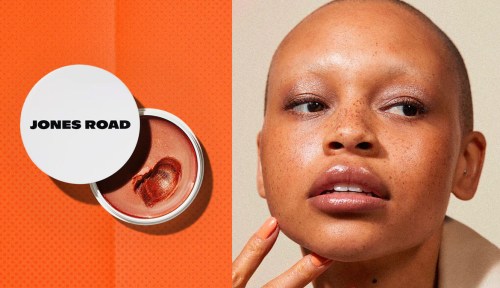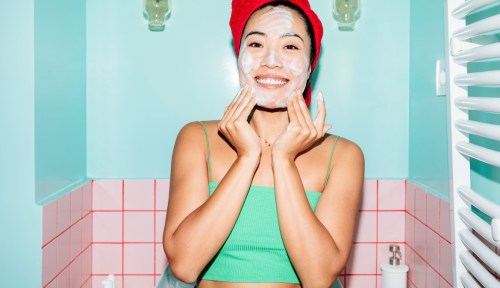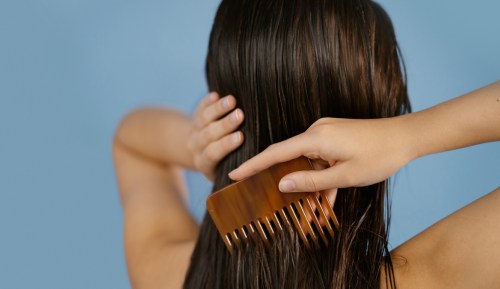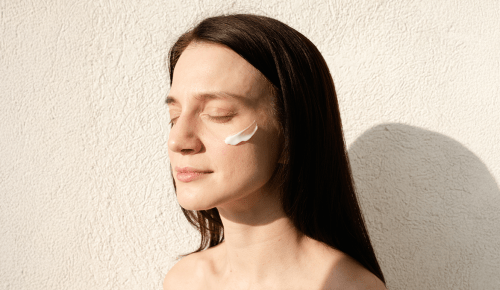Sunscreen is our most important skin-care product. Our parents weren’t dabbing cream onto our under eyes or mixing serums into our baby lotions—they were slathering us in sunscreen any time the sun even thought about peaking through the clouds. And while (hopefully) this skin-protective habit followed us into adulthood, it’s time to tweak our routines. Because many of us missed a spot—our scalps.
Though your scalp is mostly covered with hair and quite literally never sees the light of day, you shouldn’t ignore it. From scrubs to serums, scalp care is on the rise, and sunscreen brands are joining the party. Preliminary research has found prolonged sun exposure may be tied to hair damage, and Dominic Burg, PhD, trichologist (read: scalp expert) and chief scientist at Évolis Professional, says UV damage on the scalp (which can happen with or without getting sunburn FWIW) can lead to inflammation. This may disrupt the hair cycle, AKA the pattern for hair growth and regeneration.
“When the hair cycle is interrupted, the main thing that happens is the growth phase is shortened,” Dr. Burg says. “A short growth phase means less hair growing, more hair resting and more falling, and as this cycle of dysfunction progresses, hair quality decreases, and follicles eventually stop being able to regenerate a new hair, resulting in hair loss and hair thinning.” Burg adds that hair that isn’t growing optimally may also lose its natural wave or curl, may appear drier, and may not hold color or treatments as well.
But before you start applying sunscreen on your scalp daily, according to derms, you only need to worry about this kind of intense sun exposure if you’re spending a ton of time in the sun, say, on a beach vacay. One reason scalps are so vulnerable to the sun is that they are usually protected from it by hair and may not have built up any tolerance. Heather Woolery-Lloyd, MD, a Miami-based dermatologist, says this is especially true if you’re changing your part, wearing french braids or Senegalese twists, exposing bits of scalp that are essentially virgin skin. “It’s almost like if you were tanning your bottom,” explains Dr. Woolery-Lloyd. “You’re going from zero sun exposure to full sun exposure so your scalp can definitely burn.”
To protect your scalp from sun rays, Dr. Woolery-Lloyd says donning a hat is your best bet. But, if a hat doesn’t fit into your desired beach day aesthetic, you have options. Crystal Aguh, MD, a Maryland-based dermatologist, says you can apply your normal, spray-on body sunscreen to your scalp.
Spray-on sunscreens tend to be made of chemical blockers, so they won’t leave behind the ghastly white tinge that’s common of physical blockers. The downside is that because they’re aerosols, they’ll probably contain alcohols that aren’t great for you hair. For this reason, Dr. Aguh says you should only use them when you’re getting prolonged sun exposure and to wash them out when you’re done. “Occasional use of the spray-on sunscreen so you don’t get a sunburn, which is painful, it’s okay if it means that it has some ingredients that are not necessarily super appealing for the overall quality of your hair,” says Dr. Aguh.
Dr. Woolery-Lloyd adds that for her some of those ingredients are a deal breaker. “My hair is chemically straightened,” she says. “I don’t want an alcohol-based liquid because it’s going to really dry out my hair.” She recommends an SPF product that contains oils, providing protection while also moisturizing your scalp. Here, some of the best bets in the game.
How to choose the best sunscreen for your scalp
1. Find your formula
First and foremost you’re going to want to decide which kind of formula you want to use. For those who have different points of exposed scalp, you may want to opt for a mist that can be sprayed over the whole head in a number of seconds. For those who have less scalp showing, a brush-on powder might suffice.
2. Check the ingredients
As previously mentioned, some sunscreens that contain alcohols aren’t great options for everyone. Because of this, look for an alcohol-free moniker on the can, or read the ingredients label to make sure your formula won’t cause damage to your hair.
3. Check for chalky residue
If you’re opting for a powder or a brush-on sunblock, make sure to do a check to see that it’s fully integrated into your hair. One thing to note is that there are now brands that make tinted powders that can seamlessly blend with darker hair colors.
How to apply sunscreen to your scalp
If you’re using a spray sunscreen, hold the can about eight inches away from your scalp so that the stream of product doesn’t go on super thick against your scalp. You don’t need to cover the entire head as you spray, simply aim the can at the scalp and go over the areas where hair isn’t covering your skin. Wait 15 minutes to go into the sun, and remember to re-apply every two hours as needed.
If you’re using a powder, whether it’s applied with a pump or a brush, you’ll hold the tube adjacent to the skin so that it covers the scalp and use your fingers to work it into the exposed skin. Usually brush-on products and powders are physical blockers like zinc oxide or titanium dioxide, but the moisture has been taken out of the formula. Apply every two hours as needed.
Wait, isn’t this stuff just the same SPF I’ve always been using?
Yeah pretty much. There are some sunscreens that are easier to apply on your scalp like sprays and powders. Using lotions can be dicey, but if you find a formula that easily sinks into skin, you can go for it.
Shop scalp sunscreenss
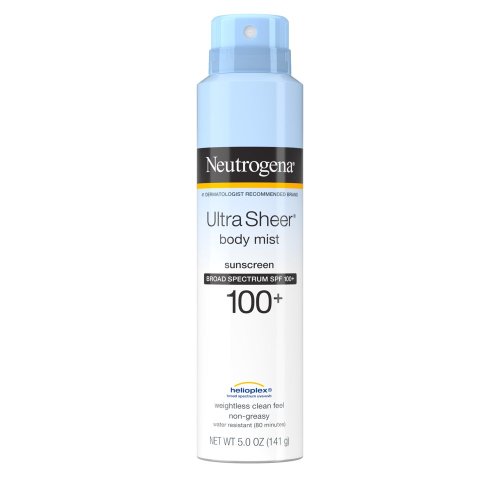
Neutrogena Ultra Sheer Lightweight Sunscreen Spray, SPF 100+ — $9.00
Feed two birds with one scone and spray this sunscreen on your scalp and body. It’s streak free so you won’t have to worry about spraying your hair white, but it contains alcohols, so you may want to avoid if you have dry hair. Because it wasn’t necessarily created with hair in mind, it comes out a bit thick; so if you’re worried about weighing down your hair, test out a small section first.
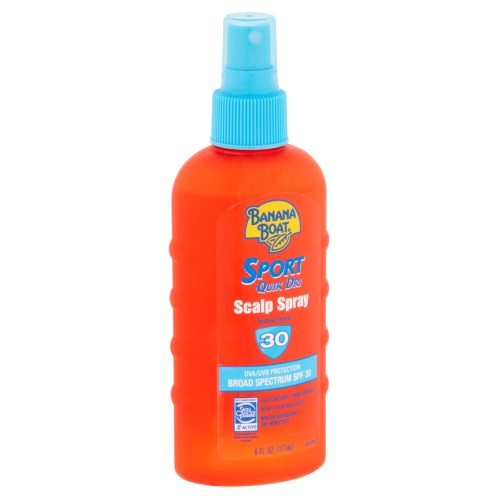
Banana Boat Sport Performance Quik Dri Scalp Spray Sunscreen, SPF 30 — $7.00
This spray is great because 1) it’s only $7 and 2) it comes out as a fine mist that won’t weight down your hair. But, because it comes out thin, be sure to spray liberally to get adequate protection. Again, be wary of this alcohol-based product if you’re worried about drying out your hair.
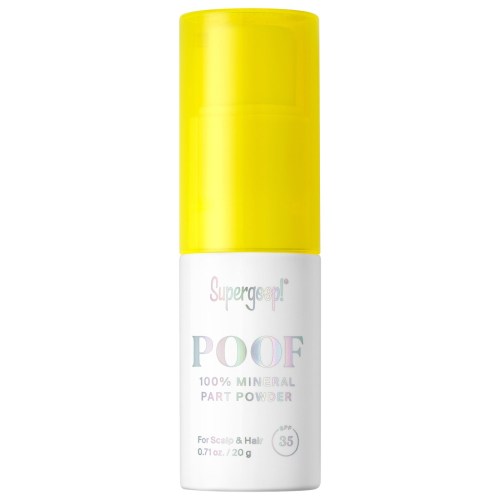
Supergoop! Poof Part Powder, SPF 45 — $34.00
Because it’s straight zinc oxide, this powder provides great sun protection. It’s also free of damaging alcohols and silicones. It comes in a “spray” bottle that more or less shoots out a pile of product, so use a light touch or even do a trial spray before heading straight for your part. Keep in mind that this powder has a chalky beige tinge so you may want to avoid it if you’re a brunette or have a deeper complexion.
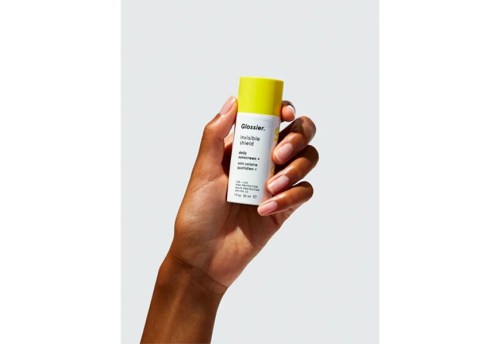
Glossier Invisible Shield Daily Sunscreen, SPF 35 — $34.00
This sheer face SPF is also great for your scalp. It comes out looking like a bit like vaseline, but it isn’t greasy and disappears into your skin when you rub it in. It’s alcohol and paraben free and has a pleasantly subtle orange scent.
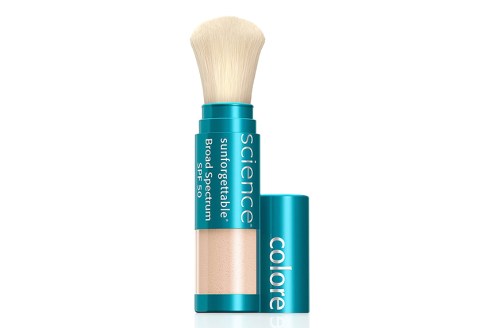
Colorescience Sunforgettable® Total Protection Brush-On Shield SPF 50
Brush this mineral SPF directly onto your part to protect it. Bonus points for it giving a slightly dry shampoo-like effect thanks to its powder formula.
Oh hi! You look like someone who loves free workouts, discounts for cult-fave wellness brands, and exclusive Well+Good content. Sign up for Well+, our online community of wellness insiders, and unlock your rewards instantly.
Sign up for the Well+Good SHOP Newsletter
Get exclusive deals on wellness, beauty, fitness, and food products that have been hand-picked by our editors.
Got it, you've been added to our email list.
